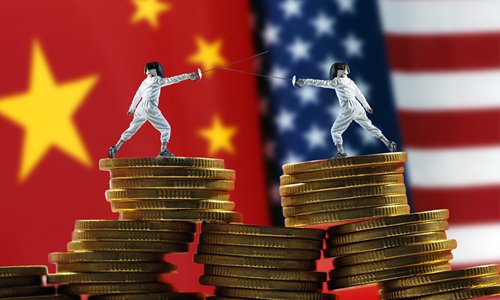HOME >> OPINION
Amid festering trade war, frustration mounts inside US
By Zhao Minghao Source:Global Times Published: 2019/9/8 20:38:40

Photo: Global Times
While cranking up the trade war with China, US President Donald Trump's administration is also reinforcing efforts to explain its detrimental effects. In a string of tweets in late August, the president refuted the view that his trade policies were hurting the US economy saying "The Economy is doing GREAT, with tremendous upside potential." He also claimed that "The farmers are going to be so happy when they see what we are doing for Ethanol," and blamed "bad management" instead of the tariffs for the "badly run and weak companies." On August 23, Trump ordered "great American companies" to "immediately start looking for an alternative to China."
However, these remarks are being increasingly rejected. Nobel-Prize winning economist Paul Krugman said the trade war "will reduce the living standards of most Americans, destroy many jobs in US manufacturing, and hurt farmers." His article published on the Palm Beach Post on September 2 stated, "The farm recession is already here, with falling incomes, rising delinquency rates and surging bankruptcies. And the farm economy's troubles stem directly from Trump's policies."
Many US farmers have been increasingly frustrated with Trump's aggressive tariff policies, which have severely undermined their livelihood, forcing them to reconsider their support to Trump.
The dissatisfaction with Trump by the US business community is mounting. They oppose the new tariffs in particular. The US-China Business Council (USCBC) said in a survey that 81 percent of US firms reported being impacted by trade tensions between China and the US. More than 160 industry groups signed a letter objecting to Trump's tariffs in late August.
The expanding scope of tariffs on Chinese imports has increased small US companies' costs and uncertainties. Based on a monthly survey of over 670 small firms carried out for the Wall Street Journal, economic confidence among them fell in August to the lowest level since November 2012. There are 40 percent of respondents expecting the economy would worsen over the next 12 months, while the figure for July was only 29 percent. The portion of small firms which said the tariff would affect their business was 45 percent.
The impact of tariffs on US manufacturing has also been revealed. The data published by the Institute for Supply Management (ISM) showed that the August PMI stood at 49.1 percent, reaching the lowest level since January 2016, a sign of contraction in the manufacturing sector.
In this context, consumption is playing a more important role in influencing US economic prospects. Many economists predict a US recession by 2021. It's the US consumption level that would determine whether the next recession comes sooner or later.
However, US consumers tend to be reluctant to purchase and have to deal with more damage from the stepped-up trade war. The Consumer Sentiment Index came at 89.8 in August 2019, falling from July's 98.4, according to the University of Michigan Surveys of Consumers, which was the largest monthly decline since December 2012. The University of Michigan economist Richard Curtin said "The August data indicate that the erosion of consumer confidence due to tariff policies is now well under way."
Craig Allen, president of the US-China Business Council, said the trade war "has become a process without a clear objective and without a clear strategy and without a clear endpoint." An increasing number of Americans are losing confidence toward the economic prospect.
Trump said the US is "in a stronger position now to do a [trade] deal [with China]," and China "want to make a deal very badly." He was lying. In fact, US firms, farmers and consumers are paying a bigger price and China is showing its firm attitude opposing Trump administration's bullying policy.
CNBC reported that Timothy Stratford, chairman of the American Chamber of Commerce in China, said one issue in the trade negotiations is Chinese confusion over the Trump administration's "real intentions." "If you're not confident that you understand the long-term intentions of the other side, then you're concerned about making commitments because you don't know where that's leading," he said.
However, a growing number of Chinese experts say what Trump administration wants is not a deal, but decoupling from China.
The fresh round of trade negotiations are expected to take place in October. If Washington does not fully reflect on its miscalculations, it may be tough for both sides to reach a positive outcome. As what Beijing has constantly emphasized, if the US wants a trade war, China will fight back to the end.
The author is a senior research fellow at the Charhar Institute and an adjunct fellow at the Chongyang Institute for Financial Studies at Renmin University of China. opinion@globaltimes.com.cn
Newspaper headline: US trouble mounts due to festering trade war
Posted in: VIEWPOINT